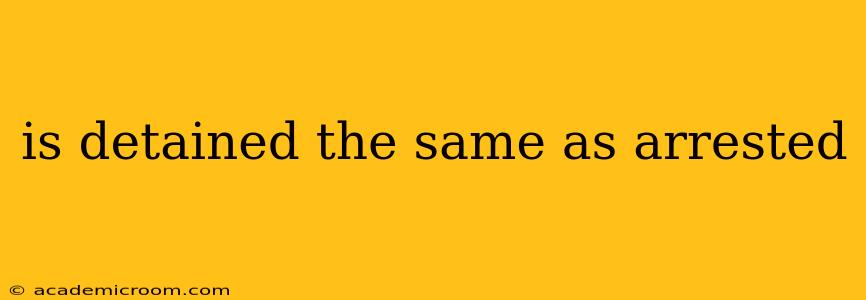The terms "detained" and "arrested" are often used interchangeably, leading to confusion about their legal implications. While both involve restricting someone's freedom of movement, there are crucial distinctions between the two. Understanding these differences is vital, whether you're a legal professional, a concerned citizen, or simply curious about the intricacies of the law.
What Does It Mean to Be Detained?
Detainment is a temporary restriction of someone's freedom of movement. It's a less formal process than arrest and typically involves a shorter period of time. Law enforcement can detain someone for several reasons, including:
- Investigative Purposes: If police have reasonable suspicion that someone is involved in criminal activity, they can detain them briefly for questioning or to investigate further. This often happens during a traffic stop or if someone matches the description of a suspect.
- Witness Identification: A person may be detained to be identified by a witness to a crime.
- Temporary Holding: Detainment can be used as a temporary measure pending further investigation, a warrant, or the arrival of other law enforcement personnel.
Crucially, detainment does not involve the formal charges associated with arrest. A person detained typically isn't read their Miranda rights (the right to remain silent and the right to an attorney). The length of detainment is usually limited and determined by the specific circumstances. If the police do not have probable cause to arrest after the investigation, the detained individual is released.
What Does It Mean to Be Arrested?
Arrest is a more formal process that signifies the taking of a person into custody on suspicion of committing a crime. Key elements of an arrest include:
- Probable Cause: An arrest requires probable cause, meaning the police have enough evidence to believe that a crime has been committed and the person being arrested committed it. This is a higher standard than reasonable suspicion, required for detainment.
- Miranda Rights: Upon arrest, an individual is generally read their Miranda rights, informing them of their constitutional rights.
- Formal Charges: An arrest typically leads to formal charges being filed against the individual.
- Booking Process: After arrest, the individual undergoes a booking process at a police station, including fingerprinting and photographing.
The arrest is a significant step in the criminal justice process, marking the beginning of formal legal proceedings. An arrested individual faces potential prosecution and penalties if convicted.
What is the Difference Between Detention and Arrest?
The key differences between detention and arrest boil down to these points:
- Legal Standard: Detainment requires reasonable suspicion; arrest requires probable cause.
- Formality: Detainment is less formal; arrest is a formal legal process.
- Miranda Rights: Miranda rights are generally not read during detainment; they are read upon arrest.
- Charges: No formal charges are filed during detainment; formal charges usually follow an arrest.
- Duration: Detainment is typically short-term; arrest marks the beginning of a more extended legal process.
Can Detention Lead to Arrest?
Yes, absolutely. Detainment can often serve as a prelude to arrest. If during the detainment process, law enforcement gathers sufficient probable cause, they can proceed with an arrest.
What Should You Do If You Are Detained or Arrested?
If you are detained or arrested, remain calm and remember your rights. If you are arrested, you have the right to remain silent and to speak to an attorney. Exercise these rights, especially if you feel the law enforcement actions are unjustified. It's always advisable to seek legal counsel as soon as possible.
This information is for educational purposes only and should not be considered legal advice. If you have specific legal questions, consult with a qualified attorney.
